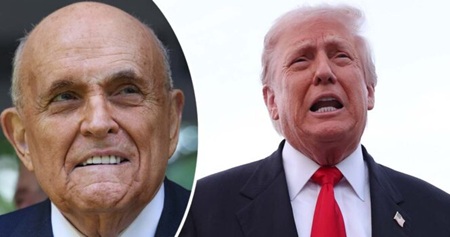
On Sunday, former President Donald Trump issued a set of a dozen new pardons, targeting some of his closest allies who were involved in efforts to overturn the results of the 2020 presidential election.
Among those included was Rudy Giuliani, the former Mayor of New York and a long-time Trump loyalist, who played a central role in what became known as the “fake electors” scheme.
Giuliani was deeply involved in efforts to pressure state legislatures in key swing states to reject the certified results showing Joe Biden as the winner, and he helped coordinate the creation of alternate slates of presidential electors in several states, which was a critical part of Trump’s post-election strategy.
The pardons were officially documented and shared by Ed Martin, the Justice Department’s Pardon Attorney, on Sunday night. The document listed numerous prominent Trump allies who had actively supported the former president’s efforts to overturn the 2020 election results.
According to the document, all those included received a “full, complete, and unconditional” pardon.
This language indicates a broad and comprehensive legal forgiveness for any federal actions related to their post-election activities, though it does not apply to potential state-level prosecutions.
In addition to Giuliani, other key figures on the pardon list included Mark Meadows, Trump’s White House chief of staff during the 2020 election;
John Eastman and Kenneth Chesebro, attorneys who devised legal strategies aimed at pressuring then-Vice President Mike Pence to reject Electoral College votes during the joint session of Congress on January 6, 2021;
and Sidney Powell, a conservative attorney who, according to Politico, spearheaded what has been described as a “fringe legal assault on election results in key swing states.”
Powell’s efforts included filing multiple lawsuits alleging widespread election fraud, which were largely rejected by courts due to lack of evidence.
It is important to note that none of the individuals on the pardon list had been formally charged with federal crimes at the time of the pardon.
This means that the pardons are primarily symbolic in nature, serving as a political statement by Trump to defend and honor those who remained loyal to him during and after the election.
By issuing these pardons, Trump publicly signals that he stands by his allies and continues to reject the legitimacy of the certified 2020 election results.
However, some of those pardoned have faced state-level investigations in Georgia, Arizona, and Nevada for actions related to attempts to subvert the election.
Presidential pardons do not extend to state crimes, meaning that individuals under investigation in these states could still face prosecution, regardless of the federal pardons.
This distinction highlights the limits of presidential pardon power and underscores the ongoing legal challenges connected to the 2020 election.
The official pardon document did not include specific dates, making it unclear when exactly Trump signed it.
It states that the pardon applies to “all United States citizens for conduct relating to the advice, creation, organization, execution, submission, support, voting activities, participation in, or advocacy for any slate or proposed slate of presidential electors, as well as for any conduct relating to efforts to expose voting fraud and vulnerabilities in the 2020 presidential election.”
This broad and sweeping language effectively shields the individuals listed from any federal consequences related to their involvement in post-election strategies, regardless of the specific actions they took.
Overall, the move is emblematic of Trump’s continued efforts to protect his allies and assert influence over the narrative surrounding the 2020 election.
While largely symbolic at the federal level, these pardons carry significant political weight, reinforcing Trump’s standing among his base and signaling ongoing defiance against investigations and criticisms of his actions following the 2020 election.
The decision also raises questions about the precedent it sets for future presidential pardons and the boundaries of executive power, especially in cases involving attempts to challenge or overturn certified election results.
In sum, the Sunday pardons are not merely legal instruments—they are a statement of loyalty and political positioning.
They reaffirm Trump’s commitment to those who supported his efforts to contest the 2020 election while simultaneously drawing attention to the unresolved legal and political ramifications of one of the most contentious elections in modern American history.
On Sunday, former President Donald Trump issued a set of a dozen new pardons, targeting some of his closest allies who were involved in efforts to overturn the results of the 2020 presidential election.
Among those included was Rudy Giuliani, the former Mayor of New York and a long-time Trump loyalist, who played a central role in what became known as the “fake electors” scheme.
Giuliani was deeply involved in efforts to pressure state legislatures in key swing states to reject the certified results showing Joe Biden as the winner, and he helped coordinate the creation of alternate slates of presidential electors in several states, which was a critical part of Trump’s post-election strategy.
The pardons were officially documented and shared by Ed Martin, the Justice Department’s Pardon Attorney, on Sunday night. The document listed numerous prominent Trump allies who had actively supported the former president’s efforts to overturn the 2020 election results.
According to the document, all those included received a “full, complete, and unconditional” pardon.
This language indicates a broad and comprehensive legal forgiveness for any federal actions related to their post-election activities, though it does not apply to potential state-level prosecutions.
In addition to Giuliani, other key figures on the pardon list included Mark Meadows, Trump’s White House chief of staff during the 2020 election;
John Eastman and Kenneth Chesebro, attorneys who devised legal strategies aimed at pressuring then-Vice President Mike Pence to reject Electoral College votes during the joint session of Congress on January 6, 2021;
and Sidney Powell, a conservative attorney who, according to Politico, spearheaded what has been described as a “fringe legal assault on election results in key swing states.”
Powell’s efforts included filing multiple lawsuits alleging widespread election fraud, which were largely rejected by courts due to lack of evidence.
It is important to note that none of the individuals on the pardon list had been formally charged with federal crimes at the time of the pardon.
This means that the pardons are primarily symbolic in nature, serving as a political statement by Trump to defend and honor those who remained loyal to him during and after the election.
By issuing these pardons, Trump publicly signals that he stands by his allies and continues to reject the legitimacy of the certified 2020 election results.
However, some of those pardoned have faced state-level investigations in Georgia, Arizona, and Nevada for actions related to attempts to subvert the election.
Presidential pardons do not extend to state crimes, meaning that individuals under investigation in these states could still face prosecution, regardless of the federal pardons.
This distinction highlights the limits of presidential pardon power and underscores the ongoing legal challenges connected to the 2020 election.
The official pardon document did not include specific dates, making it unclear when exactly Trump signed it.
It states that the pardon applies to “all United States citizens for conduct relating to the advice, creation, organization, execution, submission, support, voting activities, participation in, or advocacy for any slate or proposed slate of presidential electors, as well as for any conduct relating to efforts to expose voting fraud and vulnerabilities in the 2020 presidential election.”
This broad and sweeping language effectively shields the individuals listed from any federal consequences related to their involvement in post-election strategies, regardless of the specific actions they took.
Overall, the move is emblematic of Trump’s continued efforts to protect his allies and assert influence over the narrative surrounding the 2020 election.
While largely symbolic at the federal level, these pardons carry significant political weight, reinforcing Trump’s standing among his base and signaling ongoing defiance against investigations and criticisms of his actions following the 2020 election.
The decision also raises questions about the precedent it sets for future presidential pardons and the boundaries of executive power, especially in cases involving attempts to challenge or overturn certified election results.
In sum, the Sunday pardons are not merely legal instruments—they are a statement of loyalty and political positioning.
They reaffirm Trump’s commitment to those who supported his efforts to contest the 2020 election while simultaneously drawing attention to the unresolved legal and political ramifications of one of the most contentious elections in modern American history.




